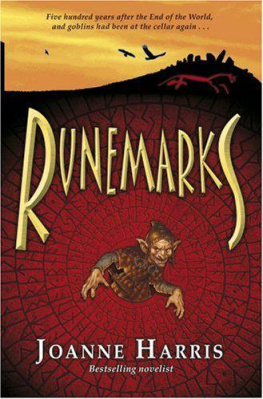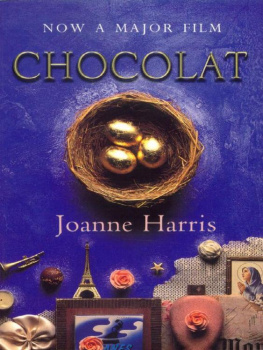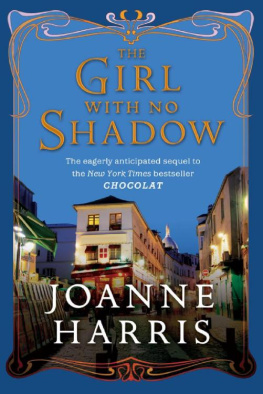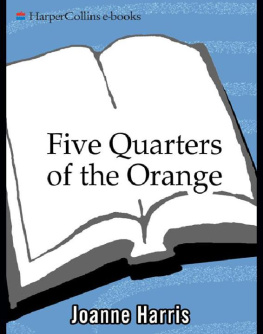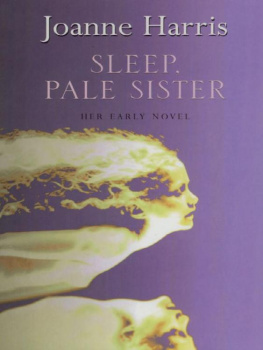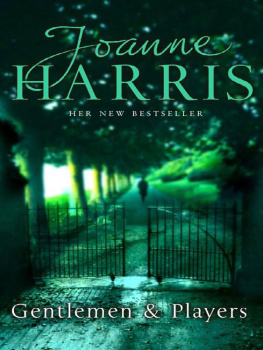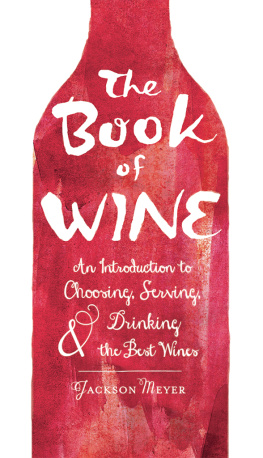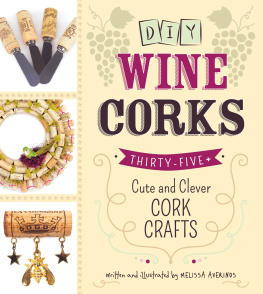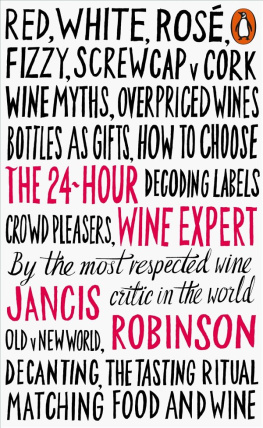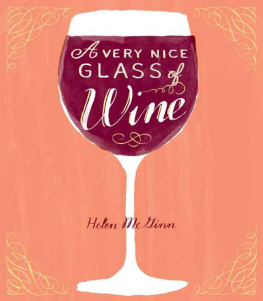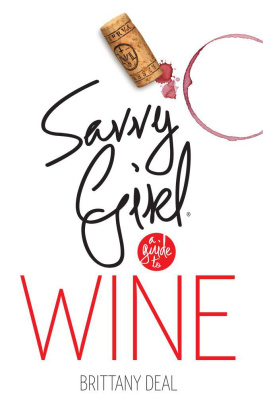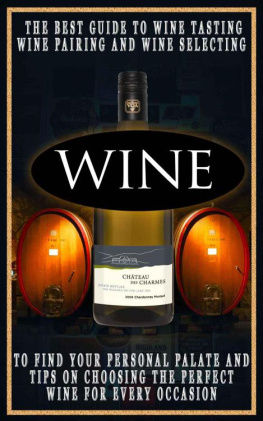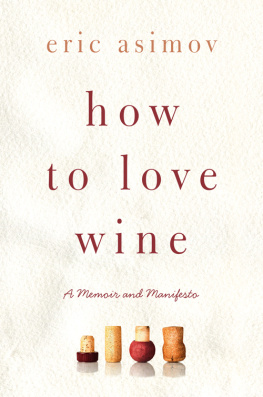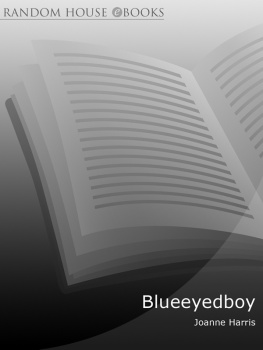
Joanne Harris
Blackberry Wine
Copyright Joanne Harris 2000
To my grandfather, Edwin Short:
gardener, winemaker and poet at heart.
Many thanks go to the following: Kevin and Anouchka for bearing with me, to G. J. Paul, and the Priory Old Boys Club, to Francesca Liversidge for her inspired editing, to Jennifer Luithlen, to my splendid agent, Serafina Clarke, for showing me the ropes, but not giving me enough to hang myself with, and to Our Man in London, Christopher Fowler. To all my colleagues and pupils at Leeds Grammar School, goodbye, and good luck. Ill miss you.
WINE TALKS. EVERYONE KNOWS THAT. LOOK AROUND YOU. ASK the oracle at the street corner; the uninvited guest at the wedding feast; the holy fool. It talks. It ventriloquizes. It has a million voices. It unleashes the tongue, teasing out secrets you never meant to tell, secrets you never even knew. It shouts, rants, whispers. It speaks of great things, splendid plans, tragic loves and terrible betrayals. It screams with laughter. It chuckles softly to itself. It weeps in front of its own reflection. It opens up summers long past and memories best forgotten. Every bottle a whiff of other times, other places; every one, from the commonest Liebfraumilch to the imperious 1945 Veuve Clicquot, a humble miracle. Everyday magic, Joe called it. The transformation of base matter into the stuff of dreams. Laymans alchemy.
Take me, for instance. Fleurie, 1962. Last survivor of a crate of twelve, bottled and laid down the year Jay was born. A pert, garrulous wine, cheery and a little brash, with a pungent taste of blackcurrant, said the label. Not really a wine for keeping, but he did. For nostalgias sake. For a special occasion. A birthday, perhaps a wedding. But his birthdays passed without celebration; drinking Argentinian red and watching old Westerns. Five years ago he laid me out on a table set with silver candlesticks, but nothing came of it. In spite of that he and the girl stayed together. An army of bottles came with her Dom Prignon, Stolichnaya vodka, Parfait Amour and Mouton-Cadet, Belgian beers in long-necked bottles, Noilly Prat vermouth and Fraise des Bois. They talk, too, nonsense mostly, metallic chatter, like guests mingling at a party. We refused to have anything to do with them. We were pushed to the back of the cellar, we three survivors, behind the gleaming ranks of these newcomers, and there we stayed for five years, forgotten. Chteau-Chalon 58, Sancerre 71 and myself. Chteau-Chalon, vexed at his relegation, pretends deafness and often refuses to speak at all. A mellow wine of great dignity and stature, he quotes in his rare moments of expansiveness. He likes to remind us of his seniority, of the longevity of yellow Jura wines. He makes much of this, as he does of his honeyed bouquet and unique pedigree. The Sancerre has long since turned vinegary and speaks even less, occasionally sighing thinly over her vanished youth.
And then, six weeks before this story begins, the others came. The strangers. The Specials. The interlopers who began it all, though they too seemed forgotten behind the bright new bottles. Six of them, each with its own small handwritten label and sealed in candle wax. Each bottle had a cord of a different colour knotted around its neck: raspberry red, elderflower green, blackberry blue, rosehip yellow, damson black. The last bottle, tied with a brown cord, was no wine even I had ever heard of. Specials, 1975, said the label, the writing faded to the colour of old tea. But inside was a hive of secrets. There was no escaping them; their whisperings, their catcalls, their laughter. We pretended indifference to their antics. These amateurs. Not a whiff of grape in any of them. They were inferiors, and we begrudged them their place among us. And yet there was an appealing impudence to these six freebooters, a hectic clash of flavours and images to send more sober vintages reeling. It was, of course, beneath our dignity to speak to them. But oh I longed to. Perhaps it was that plebeian undertaste of blackcurrant which linked us.
From the cellar you could hear everything that went on in the house. We marked events with the comings and goings of our more favoured colleagues: twelve beers Friday night and laughter in the hallway; the night before a single bottle of Californian red, so young you could almost smell the tannin; the previous week his birthday, as it happened a half-bottle of Mot, a demoiselle, that loneliest, most revealing of sizes, and the distant, nostalgic sound of gunfire and horses hooves from upstairs. Jay Mackintosh was thirty-seven. Unremarkable but for his eyes, which were pinot noir indigo, he had the awkward, slightly dazed look of a man who has lost his way. Five years ago Kerry had found this appealing. By now she had lost her taste for it. There was something deeply annoying about his passivity and the core of stubbornness beneath. Precisely fourteen years ago Jay wrote a novel called Three Summers with Jackapple Joe. Youll know it, of course. It won the Prix Goncourt in France, translated into twenty languages. Three crates of vintage Veuve Clicquot celebrated its publication the 76, drunk too young to do it justice, but then Jay was always like that, rushing at life as if it might never run dry, as if what was bottled inside him would last for ever, success following success in a celebration without end.
In those days there was no wine cellar. We stood on the mantelpiece above his typewriter, for luck, he said. When hed completed the book he opened the last of my companions of 62 and drank it very slowly, turning the glass round and round in his hands when hed finished. Then he came over to the mantelpiece. For a moment he stood there. Then he grinned and walked, rather unsteadily, back to his chair.
Next time, sweetheart, he promised. Well leave it till next time. You see, he talks to me, as one day I will talk to him. Im his oldest friend. We understand each other. Our destinies are intertwined.
Of course there was no next time. Television interviews, newspaper articles and reviews succeeded each other into silence. Hollywood made a film adaptation with Corey Feldman, set in the American Midwest. Nine years passed. Jay wrote part of a manuscript entitled Stout Cortez and sold eight short stories to Playboy magazine, which were later reprinted as a collection by Penguin Books. The literary world waited for Jay Mackintoshs new novel, eagerly at first, then restless, curious, then finally, fatally, indifferent.
Of course he still wrote. Seven novels to date, with titles like The G-sus Gene or Psy-Wrens of Mars or A Date with dEath, all written under the pseudonym of Jonathan Winesap, nice earners which kept him in reasonable comfort for those fourteen years. He bought a computer, a Toshiba laptop, which he balanced on his knees like the TV dinners he made for himself on the nights increasingly frequent now that Kerry worked late. He wrote reviews, articles, short stories and newspaper columns. He lectured at writers groups, held creative-writing seminars at the university. There were so many things to occupy him, he used to say, that he had scarcely any time to do any work of his own laughing without conviction at himself, the writer who never writes. Kerry looked at him, narrow-lipped, when he said this. Meet Kerry ONeill born Katherine Marsden twenty-eight, cropped blond hair and startling green eyes, which Jay never suspected were coloured contact lenses. A journalist made good in television by way of Forum! a late-night talk show, where popular authors and B-list celebrities discussed contemporary social problems against a background of avant-garde jazz. Five years ago she might have smiled at his words. But then, five years ago there was no
Next page

